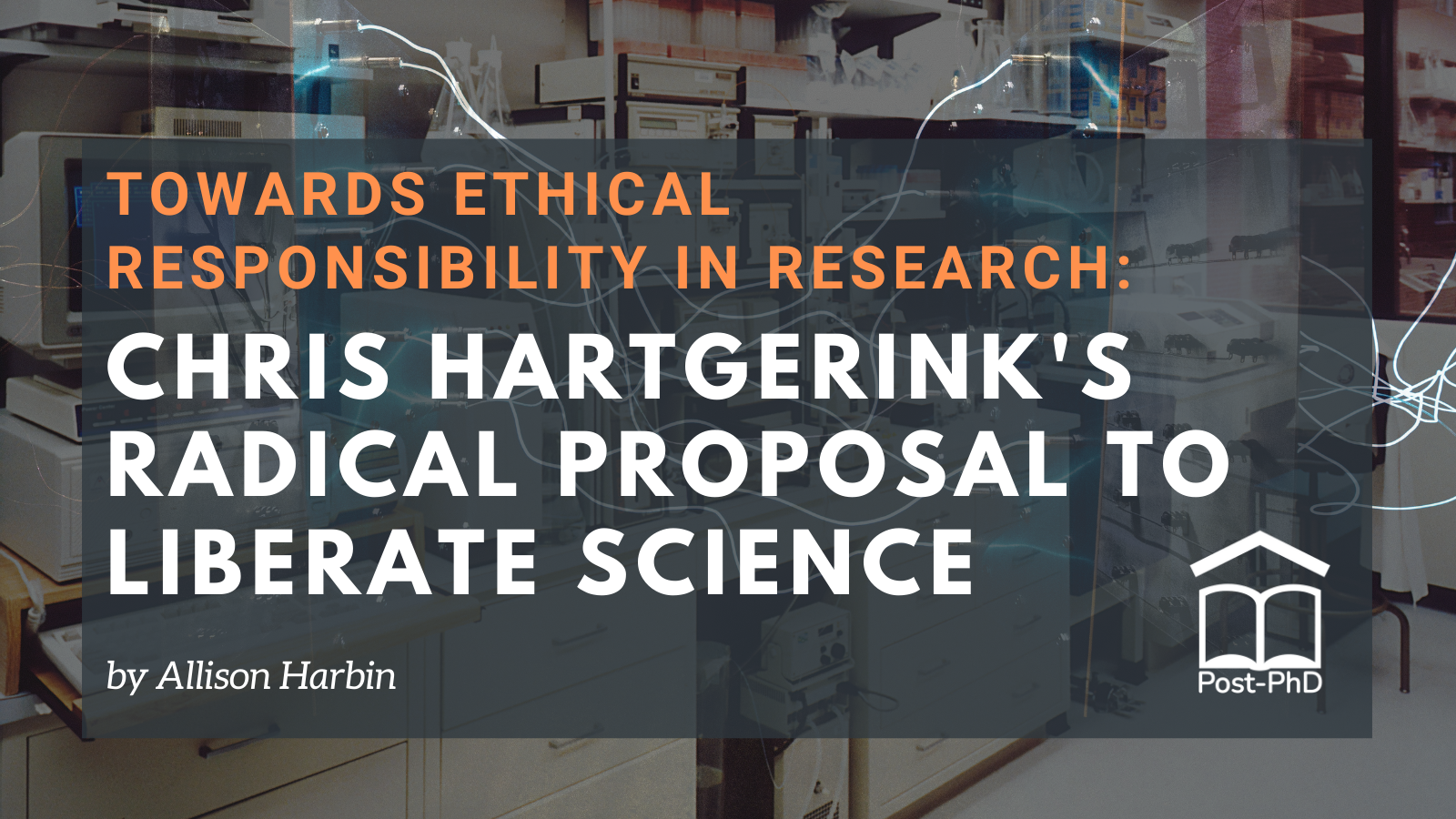Towards Ethical Responsibility in Research: Chris Hartgerink's Radical Proposal to Liberate Science
Towards Ethical Responsibility in Research: Chris Hartgerink's Radical Proposal to Liberate Science
In this post: What does it mean to unite praxis with practice as a radical academic? I answer this question through Shuttleworth fellow Chris Hartgerink's plan to Liberate Science
Next week: Society tends to hate women, and the maddening experience of being victim-blamed, being gaslit, and having your experiences trivialized.
Last week: I write about the satisfaction beyond academia, and how to continue to embody the principles ad methods you honed in academia in the real world.
“With pluralism of radical ideas, substantial change may happen. In the end, it does not matter who makes the change, but that the change happens.” -- Chris Hartgerink, Contributions towards understanding and building sustainable science, 2019.
The idea of being bound by a set of ethics has become abstract and perhaps even illusory in the halls of academe. Way back when I was an academic (ok, just four years ago), I was deeply invested in the idea of ethical responsibility and how that related to my aims as both an educator and a researcher. What does it mean to have an ethical responsibility to your field? Or to the production of knowledge itself?
I’ve written about the failure of academics to safe-guard the values of a humanities degree before, in a post, “Searching for humanity/ the humanities: Why I pursued a PhD,” where I wrote: “We have failed to rise to the occasion of defending the value of a humanities degree…. It seems we’ve lost our goddamn ability to understand the complexity of humanity in favor of reducing human characteristics down to diagnosable bullet points.”
I stand by that observation, but at the time, I did not understand just how true that was for the sciences as well, making the call to burn it down even more urgent. When scientific research is built upon fabricated data, an oversimplification of data, or even a mis-understanding of the original data-set, there are real-world consequences.
And yet, very few scientific scholars are willing to engage with this notion, much less provide alternative ways of being a researcher and sharing your results.
It is within this context that Chris Hartgerink first emailed me four years ago to discuss his own Khafkian rendition of graduate student exploitation and gross abuse of power, the details of which are his own to share. In his first email to me, he wrote: “part of the reason I’m leaving academia, on top of my own burnout, is that it just seems pointless to teach as if my school’s mission statement values are real, when all of their business practices and decisions suggest they couldn’t care less.”
What is truly fascinating about Chris is that rather than giving up, or imploding, he channeled his traumatic experience to dedicate his life to improving scientific research, engaging in the David and Goliath task of liberating scientific research from the oligarchic control of the small handful of publishing companies who produce the grand majority scientific articles. (thx neoliberal ideology for ruining everything, gah)
For us, our life’s work is a calling; we are both hellbent on enacting and living out principles of ethical responsibility. And for this, we have both been labeled radicals, whatever that term means.
While Chris and I’s aims are diverse-- I have found a calling in addressing systemic inequality and abuses of power inherent to the very way education is structured, and how that is both intrinsically and extrinsically related to racism, Chris has pursued a perhaps more immediate application of not only his skillset, but also his career through his organization Liberate Science.
Through Chris’s call to “reimagine how we can interact with other researchers,” he has done something few academics actually manage to do: he has followed through with it and founded Liberate Science (with the generous funding of the Shuttleworth Foundation, developed by the South African entrepreneur Mark Shuttleworth as an experiment with the purpose of providing funding for people engaged in social change. Chris joins an impressive cadre of Shuttleworth Fellows, such as Sean Jacob’s Africa is a Country, Anasuya Sengupta’s Whose Knowledge?, and Mark Surman of Mozilla’s experiment with open philanthropy.
In the span of just one year, Chris has enacted his vision outlined in his dissertation (and really, how many of us can say this?). Through the beta Hypergraph, Chris and the team at Liberate Science have indeed reimagined how research is conducted through creating a platform of peer-to-peer sharing that makes transparent the process of peer-review and offers more authorial safeguards against intellectual theft.
Stay tuned for next week, where I do a deeper dive into the foundations of Liberate Science, the Good Trouble it represents, and why we should all pursue our crazy ideas to the fullest.
Until then, here is a GIF story Chris emailed to me as he explained his process of coming to consciousness about the insanely damaging impact of ethical breaches in scientific publishing:
Episode 1
Episode 2
Episode 3
Episode 4 (original quadrilogy)
Join the resistance— subscribe to my weekly newsletter NSFS: Not Safe for School, I promise witty snark, critiques of education and its systemic inequality and racism, and other stories from my Post-PhD life.












In this post: Dr. Tashima Thomas gives Unsolicited Academic Advice on trusting yourself, your methodology, and finding your tribe.